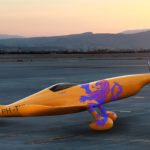IDEX 2021 featured a mix of aircraft, UAVs, air to ground missiles and new radars but most unusually, for a show taking place during a global pandemic, people.
The show went ahead thanks to strict safety regulations operated by the Abu Dhabi authorities, with daily COVID tests and compulsory mask wearing for visitors. Stand visitor numbers were also restricted to comply with social distancing requirements.
United States strongly represented at IDEX
As well as the current uncertainty caused by the COVID pandemic, there were other concerns. The recent change in the American administration saw an agreement to sell F-35s put on hold and warnings that there could be a halt to defence deals from the UK, USA and some European manufacturers, might have put a dampener on the event. But the United States was strongly represented at IDEX, signing cooperation deals with the growing local defence conglomerates.
Mark Ballew, Director of Global Sales & Marketing at Boeing, said: “We’ve been in this region for 75 plus years, we’ve got very strong ties with our defence platforms that are here that need to be able to continue to support that, obviously, as administration’s change, there’s a little hesitation here and there for what that’s going to mean. But our experience, again, over 75 years, as those new administration’s come in, we’re able to work through that we’re able to continue to do work with these countries.”
One disappointment was the planned historic presence of Israel six months on from the signing of the Abraham Accords normalising relations between Israel, the UAE and Bahrain. Israeli attendance was unable to go ahead due to travel restrictions, although some firms were able to attend from other countries.
British Army promotes space innovation
Many from the UK were also hampered by travel restrictions on their return – but recognising that the country’s presence at IDEX was essential to a region where 50 per cent of its defence exports heads, the UK called on the army.
Major Rob Deane from the defence staff at the British Embassy in Dubai promoted UK’s space technology innovation including a swarm of lunar rovers for affordable space missions.
Presenting an end to end rover service delivered by a cube satellite by X Robotics, he said: “This is representing the best of British technology when it comes to satellites and space endeavour.”
Major Deane explained how to rover could be used on the moon in the next decade. Like NASA’s Mars lander, the rover could land with payloads and sensors to explore the surface of Earth’s satellite.
Aerial targets can help guard against drone attacks
Qinetiq was present with its joint venture company Houbara and is providing aerial targets for military training from the Qinetiq range – but also to meet a particular local threat from drone attacks.
Tim Allen, CEO of Houbara explained: “We have the full spectrum of kinetics target systems available to our customers here, it’s interesting that we’re now have quite a lot of demand for the lower and slower targets, which we’ve had some time in the inventory. But they’ve become much more relevant as an accurate representation of the types of threat that forces in the Middle East in particular are facing, whether that’s in Syria, Yemen, and elsewhere from asymmetrically generated drone attacks.”
UAE’s own defence giant – Edge is now one of the top 25 manufacturers in the world. Edge, was capturing the headlines as it unveiled a new family of micro, mini and small multi-rotor loitering munitions called the QX range. It also announced a number of enhancements to products such as its Desert Sting and Thunder precision guided glide weapons. Edge signed partnership deals and sales contracts with both US and European defence businesses.

